| Srl | Item |
| 1 |
ID:
186805
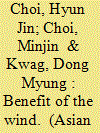

|
|
|
|
|
| Summary/Abstract |
The "rally-'round-the-flag effect" sparked by North Korea (the so-called 'Northern Wind') has been an important part of South Korean domestic politics. Despite the long history and controversy associated with politics of Northern Wind, the literature provides surprisingly little quantitative evidence on this phenomenon. In this study, we empirically investigate the relationship between North Korean-induced incidents and former President Park Geun-hye's weekly job approval ratings. Using vector autoregressions, we find that (1) President Park gained political benefits from North Korea, where negative events (e.g., armed attacks) generated a larger boost in approval than positive events (e.g., high-level talks); (2) rally effects varied across regions according to different perceptions of the North Korean regime: during security crisis, Park received the largest rallies in Gyeongnam province where the dominant image of North Korea was an 'enemy that threatens our safety'; and (3) a test of nuclear weapons or intercontinental ballistic missiles (ICBMs) did not affect approval ratings even though it captured widespread media attention.
|
|
|
|
|
|
|
|
|
|
|
|
|
|
|
|
| 2 |
ID:
123571
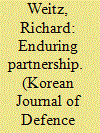

|
|
|
| 3 |
ID:
138214


|
|
|
|
|
| Summary/Abstract |
South Korean President Park Geun-hye's Eurasia Initiative, put forward in the fall of 2013, was a declaration of intent to launch a mega-project encompassing not just Southeast Asia but a far greater space. The official title is "Opening and Denuclearization of North Korea through the Peaceful Prosperity of Eurasia." The Eurasia Initiative is an ambitious plan to change the fundamentals of global economy, diplomacy, and national security geography, recreate the history of "one continent," and advance global peace within one economic bloc and market. It is a "creative organization" of the global village, something not a single world leader has ever considered establishing. President Park described her plan for peaceful prosperity in Eurasia as "Resurrection of the Silk Road".
|
|
|
|
|
|
|
|
|
|
|
|
|
|
|
|
| 4 |
ID:
160814
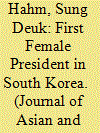

|
|
|
|
|
| Summary/Abstract |
When Park Geun-hye was elected South Korea’s first female president in 2012, many expected that South Korea’s democracy would deepen. Contrary to the expectation, however, from the beginning of her administration, there were concerns about democracy retreating due to her leadership style/qualities. Despite her rather “undemocratic” leadership qualities, Park Geun-hye has consistently received 30% or higher job approval ratings until “Choi Soon-sil gate” broke out in October 2016. Thus, in this study, we analyzed what led to her leadership qualities and makes it possible for her to maintain a relatively high level of job approval ratings. We argue that her leadership qualities are the product of her unique personal background and South Korea’s immature democratic institutions. She receives relatively strong support thanks to her father, President Park Chung-hee’s (1961–1979) legacy.
|
|
|
|
|
|
|
|
|
|
|
|
|
|
|
|
| 5 |
ID:
141490
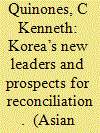

|
|
|
|
|
| Summary/Abstract |
The Republic of Korea and the Democratic People’s Republic of Korea since 1972 have attempted reconciliation, but without durable success. The latter’s building of a nuclear arsenal erased the progress achieved in 1989–1992 and 1998–2008. Assessed here is whether the new leaders of both Koreas since 2012 might be able to resume progress toward reconciliation. Ultimately, Park alone cannot sustain progress toward reconciliation unless she receives substantial domestic political support and North Korean leader Kim Jong-un responds constructively to her effort.
|
|
|
|
|
|
|
|
|
|
|
|
|
|
|
|
| 6 |
ID:
126212
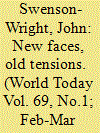

|
|
|
| 7 |
ID:
154853
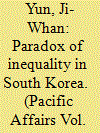

|
|
|
|
|
| Summary/Abstract |
Scholars have debated whether former South Korean President Park Geun-hye’s commitment to minsaeng kyŏngje (the economy for the people’s livelihood) was a reflection of the global rise in compassionate conservatism that attempted to address growing inequality or merely lip service to social policy. However, this debate has confined the issue to the social policy realm without explaining the paradox of inequality resulting from Park’s minsaeng drive. Although this drive allowed Park to exploit inequality for political gains, old policies of developmentalism increasingly returned to the forefront of her policy agenda. This article offers an alternative argument: that minsaeng kyŏngje was neither a sincere nor a false compassion, but a political discourse maneuvered by the Korean conservatives to reinvigorate old developmentalism in the face of inequality. The Park government first offered minsaeng kyŏngje as a catch-all discourse, which included the promotion of welfare policies and the traditional doctrine of economic development. Later, the government reinterpreted minsaeng as a subset goal of economic development. It scaled back welfare pledges and manipulated the minsaeng concept to legitimize development policies. By analyzing both the orientational and organizational characteristics of Korea’s developmental welfare state via manifesto analysis and word cloud testing, this article demonstrates how Korean conservatives made use of the norm of low taxation to avoid a systematic welfare increase and proposed an alternative minsaeng discourse by combining old developmentalism with a few welfare policies. The structure of a narrow power coalition enabled the Park government to maneuver the minsaeng discourse to fulfill its shifting policy priorities without coordination with other political actors.
|
|
|
|
|
|
|
|
|
|
|
|
|
|
|
|
| 8 |
ID:
121712
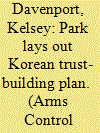

|
|
|
|
|
| Publication |
2013.
|
| Summary/Abstract |
South Korean President Park Geun-hye last month laid out a process for building trust on the Korean peninsula, an approach she said she hopes will lay the groundwork for "durable peace" and eventually unification.
|
|
|
|
|
|
|
|
|
|
|
|
|
|
|
|
| 9 |
ID:
173957
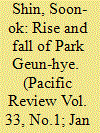

|
|
|
|
|
| Summary/Abstract |
The political turmoil prompted by the corruption scandal surrounding president Park Geun-hye and her confidante, Choi Soon-sil, convulsed South Korea in the winter of 2016/17. Park’s response was not only ineffective, but inflammatory. Intense public frustration, together with mounting circumstantial evidence, led to an impeachment process. Thus Park became the first democratically elected president to be removed. Political corruption is not new in South Korea. Yet, no previous case matches the magnitude of the Park debacle and no former president has had to sacrifice their term in office. This raises a key question: what is it that made this scandal so different? This article argues that the debate has so far paid insufficient attention to the role of the South Korean political system in explaining Park’s impeachment. The government party was the largest in the National Assembly and thus able to stop the impeachment process, but failed to do so. The article unpacks the political unrest of 2016/17 by analysing South Korean party politics, focussing specifically on the electoral structure that had been established in the post-1987 democratic era and the subsequent changes that conditioned and facilitated the political downfall of Park Geun-hye.
|
|
|
|
|
|
|
|
|
|
|
|
|
|
|
|
| 10 |
ID:
139779
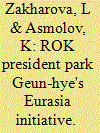

|
|
|
|
|
| Summary/Abstract |
The Eurasia Initiative advanced by President Park Geun-hye of the Republic of Korea (ROK) in October 2013 has become a major project that South Korea is now promoting on the international scale. The authors of this article survey the major point of the Eurasia Initiative originating in the Republic of Korea and assess its high points from the perspective of Russia's interests in the region. They also take a close look at President Park Geun-hye's approach to relations with North Korea and her Korea unification policy.
|
|
|
|
|
|
|
|
|
|
|
|
|
|
|
|
| 11 |
ID:
146028
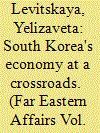

|
|
|
|
|
| Summary/Abstract |
The first decade of the 21st century well past it already, the Republic of Korea has suddenly been confronted with a hard option. Having wowed the world with its "economic miracle" and what has looked like its unshakeable standing in the world market, the country has run into a tight knot of problems where its good economic fortunes could suffer a severe reverse.
|
|
|
|
|
|
|
|
|
|
|
|
|
|
|
|
| 12 |
ID:
121695
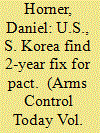

|
|
|
|
|
| Publication |
2013.
|
| Summary/Abstract |
South Korea and the United States announced last month that they have agreed to extend for two years their current agreement for peaceful nuclear cooperation, an acknowledgment that they could not resolve contentious issues dealing with South Korea's commercial nuclear fuel-cycle plans in time to adopt a successor agreement before the current pact expires.
|
|
|
|
|
|
|
|
|
|
|
|
|
|
|
|